Campaign Finance Reform and Biblical Faith
What are the critical threats to the ethical and effective functioning of democracy? In response to that question, the Rev. Dr. Chris Iosso wrote “Seven Sins Against Democracy: And What’s Faith Got To Do With It” and then invited knowledgeable respondents to join the conversation, expanding upon some of the sins he identified. The following is a response to the first “sin” of campaign finance corruption. By Rev. Timothy F. Simpson, Managing Editor of Political Theology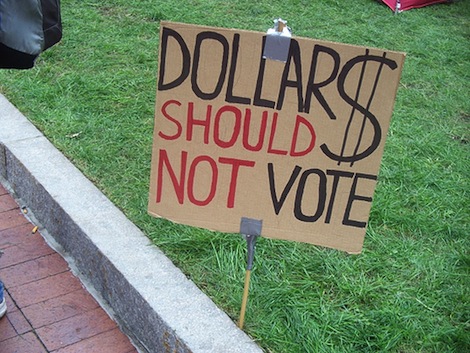 Money is destroying democracy. The commodification of what should be the common good has, over the last generation, increasingly overridden the people’s control of our polity and has instead brought it further and further under the influence of a handful of wealthy elites and large corporations.
Money is destroying democracy. The commodification of what should be the common good has, over the last generation, increasingly overridden the people’s control of our polity and has instead brought it further and further under the influence of a handful of wealthy elites and large corporations.
The sums are enormous. Earlier this year, for example, Gov. Scott Walker (R-WI), in his campaign to beat back a recall effort, spent roughly the same amount of money in just one state as Vice President Al Gore spent in his entire general election campaign for the presidency across the whole country in 2000. The Center for Responsive Politics estimates that more than $6 billion will be spent on just the presidential and congressional elections alone. By contrast, in the most recent parliamentary elections in the United Kingdom two years ago, the BBC reports that all parties combined spent only $49 million, a figure that wouldn’t even be enough to allow one to remain governor of Wisconsin. The UK is not as large of a country as the United States, but we certainly aren’t 120 times larger.
___________________________________________
The failure to enact campaign finance reform under the naïve assumption that, in so doing, we are protecting free speech, papers over the sin of inequity, much like the “false balances” described in scripture which look perfectly normal but which actually register improper weights and which thus cheat people out of that which is fair (Prov. 11:1).
___________________________________________
Our system, created with the intention of diffusing power and influence across society, after having reached its zenith in the Voting Rights Act of 1965 (which finally guaranteed access to the political process for everyone), has since devolved backwards towards the aristocratic origins from whence it sprang. Having rejected rule by hereditary nobility as unjust in favor of a meritocratic system in which virtue, rather than blood, was the prime qualification for leadership, American politics is now effectively controlled by those with the most money, who purchase the votes of those with the most pliancy. As a result, the quest for money on the part of politicians from those who will be petitioning them as soon as they are elected has become the primary work of our national legislature.
The quest for more and more campaign money on the part of our elected officials is relentless, consuming on average several hours per day of a member’s time and energy. It wasn’t always so. Elected officials used to devote much of that time and energy to civic pursuits. Former Senator and Anglican priest John Danforth recalls that when he came to Congress, there was a great deal of friendship, camaraderie, and sense of common purpose, even in disagreement, even across the aisle. People like Orrin Hatch (R-UT) and the late Ted Kennedy (D-MA) could be close friends. Members remained in D.C. most weekends, often spending time together and with each other’s families, building relationships as well as trust.
But not any more. Ideological purists like the Tea Party have made friendships across the aisle radioactive, but even if one were so inclined to start one, and most politicians now are not, there would scarcely be any time. Sit at the TSA security checkpoint at Reagan National Airport in Washington between 4-6 PM on any given Friday night and you’ll see scores of members of Congress heading back to their districts for fundraisers Saturday and Sunday. Something similar happens three or four nights a week even when members are in Washington, as the local lobbyists dangle big money before them.
Because the primary role of a member of Congress has now become fundraising, the business of policy mastery is now left to the staff. And these staffers are notoriously low-paid and over-worked—and this in one of the most expensive cost-of-living cities in North America, making them easy prey for the K Street lobbying firms just blocks away from Capital Hill. Here, staffers who become lobbyists can earn what they believe they are worth. They lobby the very member whose staff he or she just left, using their mastery of the policy and working with friends who are still on Congressional staff, many of whom hope one day also to be on the other side of the table. The lobbyists then leverage their knowledge and relationships into the passing of legislation that will benefit their client, corporation, or industry. In a growing number of instances the lobbyists actually write the bills they want the member to introduce as legislation.
___________________________________________
This is the major flaw in the Citizens United Supreme Court decision. Democracy doesn’t
simply work because people have the right to speak or to vote. Rather it works because of the public airing of issues in which the citizens are enabled to inform themselves so as to choose the good.
___________________________________________
And why not? They know the policy details as well as anyone. Sometimes the lobbyists become, for a time, Congressional staffers, receiving bonuses to compensate for the loss of pay. In other cases, members of Congress, like former Sen. Evan Bayh (D-IN), themselves become lobbyists after leaving office. This so-called revolving door between Capitol Hill and K Street is at the heart of the issue of campaign finance reform. Donors give money to candidates so that if elected, the candidate will grant the much-coveted access. There have been half-hearted attempts at reform in this area, such as in 2007, but nothing that could not be easily gotten around.
No seat is safe anywhere in elected office, either nationally or locally, with the money flowing like it is. And the pressure to take the money is acute: every candidate has to assume that his or her opponent is out, hat in hand, doing precisely the same thing, so that any let up, for even a pang of conscience, may be the irretrievable moment when the contest for cash is lost and hence the election, since whomever has the money to control the airwaves usually wins.
The proximate cause of the flood of money is the Citizens United Supreme Court decision. In his recent book on the Court, legal analyst Jeffrey Toobin explains how a fringe legal theory held by Justice Clarence Thomas has now come to dominate the Court’s thinking on the issue of campaign finance reform. The idea that money is speech has now swept aside decades of settled law that had previously understood the unbridled use of money as something detrimental to our political process. The moral problem is that those with more money can exert much greater influence on the outcome of elections than can the average citizen, because of their ability to control the debate.
This is the major flaw in the Court’s opinion. Democracy doesn’t simply work because people have the right to speak or to vote. Rather it works because of the public airing of issues in which the citizens are enabled to inform themselves so as to choose the good. Leaving the airing of these issues to those with all the money means that the issues ultimately aired will be done so by and for the benefit, not of the citizenry, but of the wealthy individuals and corporations who are footing the bill. Plato was suspicious of democracy, having seen the mass of Athenian citizens hoodwinked by unscrupulous people who hijacked the conversation in the public square for their own ends. That same malady now has a grip on American democracy, to the detriment of the people.
The ultimate cause of the commodification of democracy is that, as a culture, we have embraced the notion that our primary role in life is that of consumer. Our entire existence revolves around our engagement in transactions. As theologian Harvey Cox has pointed out, the marketplace has become God for most of society, functioning as the secular substitute for what previously had been religiously-oriented expressions of transcendence. In this hyper-individualistic age, everything, including democracy, has a price and furthermore, everything you need to know about what’s for sale can instantly be quantified in that price. No need to quibble over values or ideals. The only things that matter, in this dystopian view of economic freedom, is whether government is interfering in your transaction and whether you can afford it. If you want it, you should have it. As William T. Cavanaugh has persuasively argued in his book Being Consumed, this view of freedom may be adequate for secular society, but it is wholly incompatible with Christian faith, which requires deeper questioning about the motives and consequences of any transaction, much less the selling of democracy itself.
___________________________________________
In this hyper-individualistic age, everything, including democracy, has a price. No need to
quibble over values or ideals. The only things that matter, in this dystopian view of economic freedom, is whether government is interfering in your transaction and whether you can afford it. If you want it, you should have it.
___________________________________________
The biblical principles of mishpat and tzedekah, justice and equity, two of the most important words in all of scripture, can helpfully inform Christian ethical reflection on campaign finance reform. Mishpat has more to do with the formal aspects of righteousness, such as in Lev. 24:22 where the Israelites are enjoined against having two standards of justice, a mishpat for themselves and another mishpat for the stranger. Such a dual-track system is unfair; everyone should be judged by the same standard, regardless of social characteristics.
Tzedekah, on the other hand, places the emphasis more on the orientation of the heart in the doing of the action, the motive underlying what is done. Older translations often use the term “righteousness” to translate tzedekah, but the more modern translation of “equity” gets more to the “heart” of the meaning, for it shows that what is being sought in the application of justice is not simply formal adherence to the law, but an essential fairness which treats each one with as much regard and respect as the other.
A great illustration of this principle in biblical faith is in the Lex Talionis of Exod. 21:22-25, the law of retribution, whose “eye for and eye” construal of justice sounds barbaric in many modern ears. Even that was a great leap forward for ethics, at a time in the Ancient Near East when the eye of a king was worth infinitely more than the eye of a peasant. The same idea is conveyed in the biblical passages on debt forgiveness (Exod. 21:2; Lev. 25:10) and the requirement to leave the edges of fields unharvested (Lev. 19:9-10; Deut. 24:19-20). In both instances, the idea is that the demands of justice (mishpat) are met in a kind of “evening things up” (tzedekah) for people at the economic and political margin. Justice and equity, the fundamental principles of fairness, is how scripture says that God judges the creation (e.g. Ps. 9:8; 45:6) and, more importantly for this discussion, how, ideally, the king rules his people (e.g. 2 Sam. 8:15; Prov. 29:14).
We no longer have kings, yet we may properly extrapolate from these texts an understanding of how such a principle bears on a modern democratic context. The flood of money into our political process, designed as it was to operate “with liberty and justice for all,” is completely skewed instead in the direction of those who have been blessed with an excess of wealth. Their interests are amplified beyond that of the average person in virtue of their access to candidates who need their money, as well as access to the media through which they can more effectively persuade the people directly. The disproportionate effect is this: the wants of the well-off take center stage in the public square, while the needs of those who cannot skew the conversation in their direction are usually forgotten or ignored. The failure to enact campaign finance reform under the naïve assumption that, in so doing, we are protecting free speech, papers over the sin of inequity, much like the “false balances” described in scripture which look perfectly normal but which actually register improper weights and which thus cheat people out of that which is fair (Prov. 11:1). That Yahweh “delights,” as the text claims, in the giving of accurate weight, in this case namely the right to equitable participation in democracy to each citizen, should make the need for campaign finance reform of no small importance to those who seek to inform public life with a biblical faith.
Read about other threats to democracy in the complete series, “Seven Sins Against Democracy”
Rev. Timothy F. Simpson, Ph.D., is Managing Editor of Political Theology. He and his wife, the Rev. Kathryn A. McLean, pastor the Lake Shore Presbyterian Church in Jacksonville, FL, where he also teaches part-time at the University of North Florida in the Department of Philosophy and Religious Studies. He also serves on the National Committee of the Presbyterian Peace Fellowship.


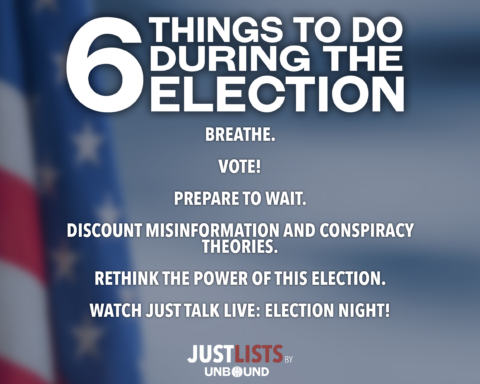
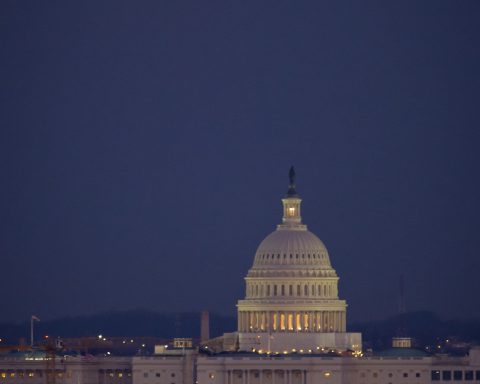
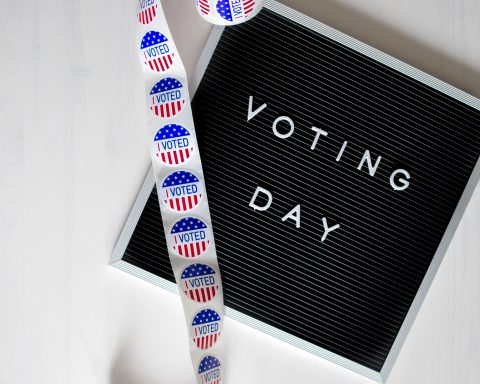
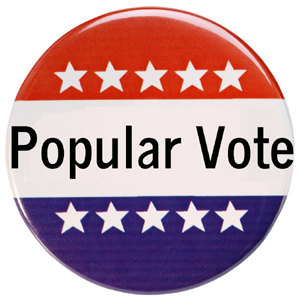
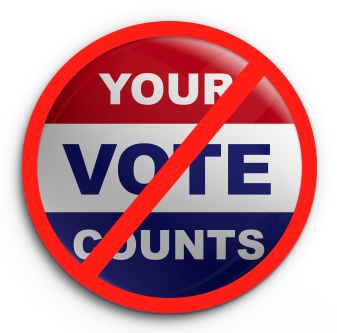
Unbound Social